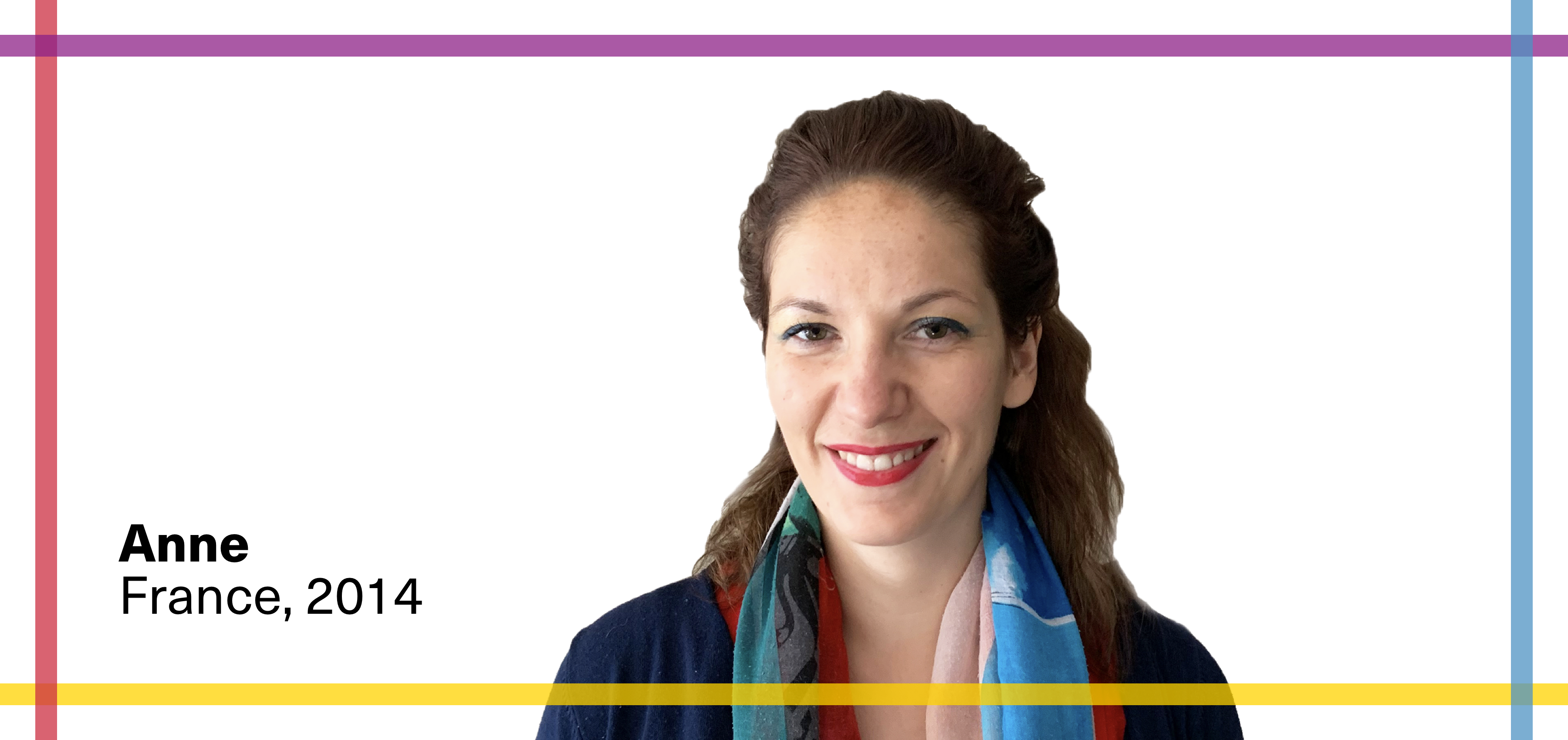From an interview with Anne Stoll.
Anne Stoll and her husband came to Canada from France in 2014 on a working holiday visa. As students they had done a significant amount of travelling. This informed their decision when it came to moving to another country. What led them to Canada was their desire to live in a society that was relatively balanced in terms of economics, politics, and the environment. One where, as a woman, Anne could live, work, travel with no limits, and where being a native French speaker would be considered an asset.
Anne saw that moving to a place where people spoke a language other than their mother tongue would be a reminder that they needed to make the effort it takes to integrate. Part of that process for Anne was educating herself about First Nations, Inuit and Métis people.
She shares her story of learning, connecting, and respecting Indigenous people who live in Canada.
“I want to acknowledge that I’m living, learning, and working on the traditional and unceded territories of the Coast Salish people. In particular, the Squamish, Musqueam, and Tsleil-Waututh nations.”
I’m a white person from Europe who speaks two languages, I have a master’s degree, and I came to Canada with a working visa. I recognize that all of this places me in a position of privilege. I have a background in communications, social economics and sustainable development. Together with a love for art and history, a deep interest in people and culture, and a heart filled with goodwill, this has informed my approach to Canada. I was very interested in learning about Indigenous People in Canada.
In France, people would call First Nations people “Indians,” and sadly the depictions in popular children’s books were stereotypical cartoons. I didn’t think about those stereotypes until I came to Canada. But after I arrived here, I went to museums and galleries and began to learn about Indigenous arts and cultural practices. That was my introduction and it sparked my interest. I wanted to learn more and through books by Indigenous authors, storytelling, conversations, and workshops I learned more about Canada’s First Nations.
National Indigenous Peoples Day: a good time to start
June 21st is National Indigenous Peoples Day. A day for all Canadians to recognize and celebrate the unique heritage, diverse cultures, and contributions of First Nations, Inuit and Métis peoples. It coincides with the summer solstice – the longest day of the year and a traditional time of celebration for many Indigenous communities.
At a National Indigenous Peoples Day event I attended in 2015, I had a brief conversation with one of the dancers who had performed in a ceremonial dance. I complimented her on her costume or dance outfit and she corrected me, insisting that it be called regalia. At the time the word was new to me, but I understood it was important to her and that there was more to learn around language. Words matter.
I have also witnessed racism towards Indigenous people. This made me reflect on the vision I had of Canada and the cultural approach that seems to embrace cultural diversity, inclusion, and finding consensus, even if we’re not from the same background or culture. Canada is a very welcoming society, but like everywhere, racism exists.
I had the chance through my work at the B.C. Provincial Health Services Authority to participate in an incredible training program called San’yas Indigenous Cultural Safety Training. The program is designed and led by experts from First Nations communities. We learned about the history of organized genocide and the residential school system, along with the effects of ongoing institutional and systemic racism. The goal of the training was to educate health care workers so that care and services could be provided without discrimination.
Some people in government or institutions might say, “Oh, that was a dark chapter in our history, those were different people in a different time.” But It’s actually eye-opening to learn how directly and fully this continues to impact Indigenous people today.
I needed time to digest all that.
My job as Coordinator for Francophone Services at the Provincial Health Authority in B.C. reminded me that I speak one of the languages of the colonizers, and I am part of a large institution. Also, as a white European I don’t have to endure racism, or feel in danger of having my culture erased.
I realized that I came as a settler and I was very happy to settle down in Vancouver. The relationship between settlers and First Nations is a central issue, and when these topics came up I was pretty confused. And the more I was learning, the more that question came about: Am I legitimate here?
I felt very uncomfortable about that, and although it’s still on my mind, I recently received answers from members of local First Nations communities that helped me. Gerry Oleman, a member of the St’at’imc Nation from Tsal’alh, opened a town hall session I attended. He said that he did not consider us as settlers, because of our attitudes, the fact that we were working in healthcare – in the service of other people – with a will to integrate, to be delicate around cultures, and to be inclusive.
I’m really happy to take part in a community farm where my husband and I and our kids get to meet people from different places and cultures. That’s where I met Pulxaneeks, who is from the Eagle Clan of the Haisla Nation. She suggested that we consider First Nations people as hosts and ourselves as guests. We have been invited to a friend’s place, who is welcoming us into their house. As guests, we should be respectful of the place.
I read and continue to read a lot of books by Indigenous authors. They help me build my knowledge base, and become better informed. Here are a few titles and resources you may find helpful:
| Books |
| Legends of Vancouver – E. Pauline Johnson |
| The Inconvenient Indian – Thomas King |
| Green Grass, Running Water – Thomas King |
| 21 Things You May Not Know About The Indian Act – Bob Joseph |
| Courses and groups |
| Indigenous Canada |
| Ontario Federation of Indigenous Friendship Centers |
| Decolonize Myself – A First Nations Perspective |
Educating your kids is another chance to learn
When our children were born we had to ask ourselves what values we wanted to instill in them. Which is fascinating and challenging. I want my kids to be aware of diversity: diversity of abilities, languages, skin colour, faith, or culture. I really want them to be aware of Canada’s Indigenous peoples and their thriving cultures, and that there are things we also need to learn from them. This doesn’t mean I am rejecting everything I come from. Instead, it’s kind of learning, comparing, bringing all that into the discussion basically.
Even when I borrow books at the library, I make sure I have a selection that includes stories from Indigenous cultures: First Nations, Métis, and Inuit. It’s about making it part of the conversation. We’re first generation settlers. Our kids are Canadian first and then French. So already we have to think about this different cultural level, which is a great opportunity for teaching and learning. My eldest joined her first First Nation celebration last year. Because of COVID, It was online. But we’re starting the conversation.
I am multiplying my efforts, joining workshops and conversation groups on a range of topics so that I can act in an informed way. That could mean signing petitions, supporting First Nations businesses, acknowledging the land we are on, and even in the words I choose to use.
Like most newcomers to Canada, we put a lot of energy into finding a job, a house, getting health insurance, and finding ourselves in safe places. But to create that safe space we must contribute to it. Because we’re guests and we should be contributors, we should definitely also be grateful to and mindful of the First Nations who were here before any of us came, and who are still here.
I feel that it’s the responsibility of everybody to both greet and welcome other people and also to learn more about their cultures. A key part of this process is to learn more about and respect First Nations people in Canada.
It’s easier for me to talk about these issues now having been living and learning in Canada for seven years. And while it may not be at the top of your things to do list in Canada, keeping it in mind and creating opportunities to learn about Indigenous cultures can only contribute to making this land a culturally welcoming, and positive place for everyone.




